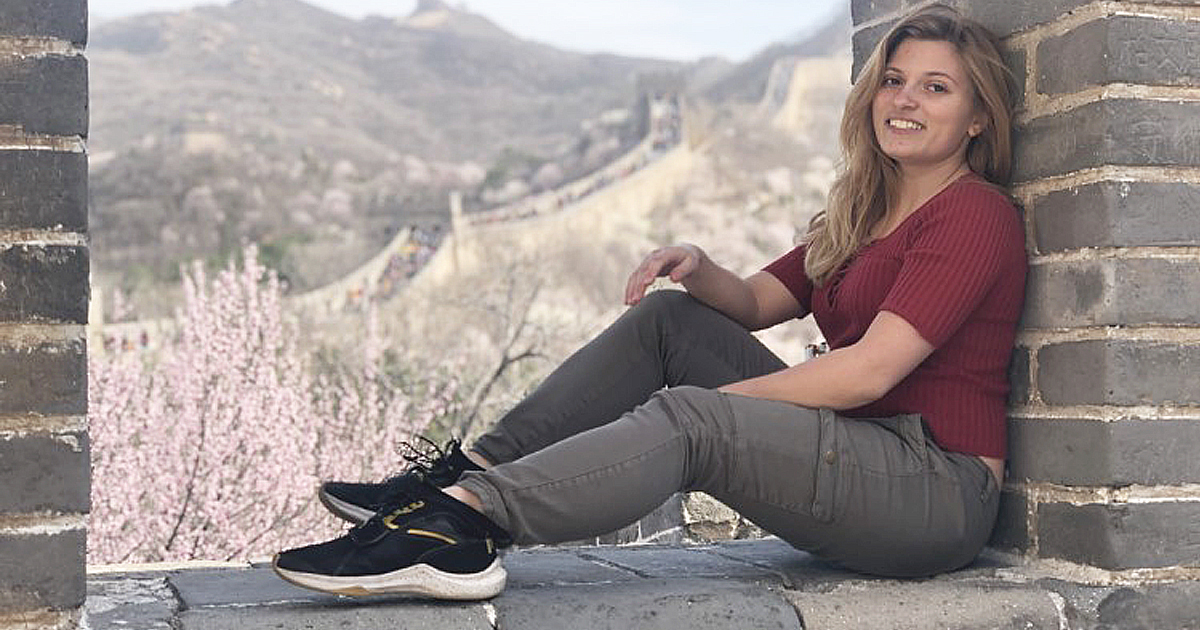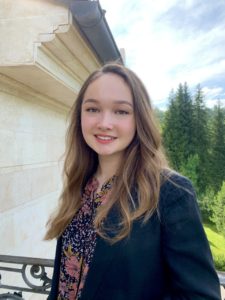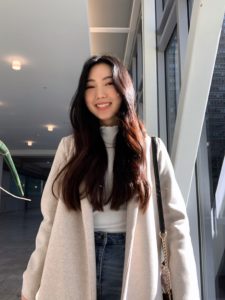Babson and Iraqi Students Team Up to Tackle Public Health Problems During COVID-19

Dina Baimenova ’22 spent six weeks this summer helping a local nonprofit study why vaccination rates were low within its community. Her partners in this research also were students—in Iraq.
Baimenova is one of three Babson College students who participated in the U.S.- Iraq University Global Public Health Covid-19 Addressing Healthcare Inequity program. The goal of the program—organized by United Planet and funded by the U.S. Embassy in Baghdad this year—was to bring together students from diverse backgrounds to address public health challenges related to the COVID-19 pandemic.
The program organized a total of 110 undergraduate and graduate students into teams, then paired them with an Iraqi or American nonprofit. For six weeks, they met over Zoom to develop social media campaigns, websites, and videos. The groups then presented their projects to their partnering organizations and the embassy on August 3 and 4.
Vaccine Hesitancy

Dina Baimenova ’22
Baimenova worked with Roca, a nonprofit based in Chelsea, Massachusetts, that attempts to curb urban violence by working with the young people who are often at the center of it: lower-income young men with a history of trauma. Roca also provides high school equivalency classes, job training, and, through United Planet, COVID-19 vaccine information.
The U.S.-Iraqi team looked at the “social determinants” at play in vaccine hesitancy, Baimenova says, for example, “How does the background of at-risk youth affect COVID behavior?”
What the students found was that there were a lot of similarities between the Iraqi and American populations, says Baimenova—a lot of the same fears and mistrust when it came to getting the vaccine.
Fortunately, the students also found that “as education (about COVID-19) grew, so did vaccination rates,” says Donna Lubrano, virtual exchange officer at United Planet. So, one of the key goals of the project was to develop ways to get the information out.
Pivoting the Message
As in the United States, vaccine hesitancy is a major challenge in Iraq, according to The Washington Post. To better understand why rates are so low, Dominique Csehill ’24 worked with the United Iraqi Medical Society (UIMS). Her team surveyed the Iraqi population, asking them “why they fear COVID, if they’re vaccinated, where they get their information from,” Csehill says.
Her team interviewed close to 900 people across six weeks. “It was a lot of work,” she says, but “our Iraqi team nailed it.”
The goal was to create a targeted marketing campaign to reach those wary of vaccines. The research Csehill’s team conducted showed that Iraqis get much of their information from social media and trust it over information coming from their government and health system.
“I definitely improved my cultural competence. … They had a lot of great ideas, so that made it easy to collaborate.”
Jungmin Park ’23
“When our data showed people did not trust doctors or medical institutes, we immediately stopped advertising like one,” Csehill says. “We switched to posting videos debunking myths instead of just posting data from hospitals.”
Jungmin Park ’23 worked with the Mattapan Food and Fitness Coalition, a community health and wellness nonprofit, primarily on grant writing and connecting them with “donor organizations that fit their mission” and also on social media campaigns to promote vaccinations.

Jungmin Park ’23
“I definitely improved my cultural competence,” Park says, although she expected working with a completely different culture to be more challenging than it was. Her Iraqi counterparts “had different opinions, but they were open to sharing them and they had a lot of great ideas, so that made it easy to collaborate,” she says.
Finding Common Ground
Beyond the team’s project work, another equally important goal of the program was to encourage students to become “global citizens,” says Amir Reza, dean of the Babson Academy for the Advancement of Global Entrepreneurial Learning.
“Babson students have traditionally gone to places that are more accessible in the Middle East,” he says. Ironically, the COVID-19 era allowed them to consider countries, such as Iraq, that “would have been difficult in a non-virtual world,” Reza says.
Read more about Glavin Global Fellows
To an older generation, a U.S.-Iraq collaboration might seem daunting, given the fraught history between the two nations, including the U.S. invasion of Iraq in 2003, but Park says, “I didn’t think too much about big cultural differences going into it.”
Csehill and Baimenova agree that, ultimately, what they had in common with their Iraqi counterparts outweighed their differences. “Because we’re all college students,” Park says, “and we’re all going through the same experiences as growing adults.”



